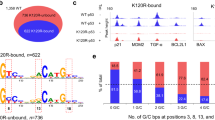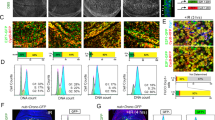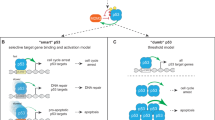Abstract
p53 induces the transcription of genes that negatively regulate progression of the cell cycle in response to DNA damage or other cellular stressors, and thus participates in maintaining genome stability. Under stress conditions, p53 must be activated to prohibit the replication of cells containing damaged DNA. However, in normal, non-stressed cells, p53 activity must be inhibited. Previous studies have demonstrated that p53 transcription is activated before or during early S-phase in cells progressing from G0/G1 into S-phase. In that this is not what would be predicted from a gene involved in growth arrest and apoptosis, in this study, we provide evidence that this induction occurs to provide available p53 mRNA in order to prepare the cell for DNA damage in S-phase, ensuring a rapid response to DNA damage before exiting this stage. When comparing exponential to synchronized Swiss3T3 cells upon Camptothecin-induced DNA damage, we found that in synchronized cells, p53 protein levels increased earlier, Bax and p21 transcription was activated earlier and to a greater extent and apoptosis occurred earlier and to a greater extent. These findings are consistent with p53 transcription being induced in S-phase to provide for a rapid DNA-damage response during S-phase of the cell cycle.
Similar content being viewed by others
Article PDF
Author information
Authors and Affiliations
Corresponding author
Rights and permissions
About this article
Cite this article
Reisman, D., Takahashi, P. & Polson, A. p53 Response to DNA Damage in S-phase. Nat Prec (2010). https://doi.org/10.1038/npre.2010.4403.1
Received:
Accepted:
Published:
DOI: https://doi.org/10.1038/npre.2010.4403.1



